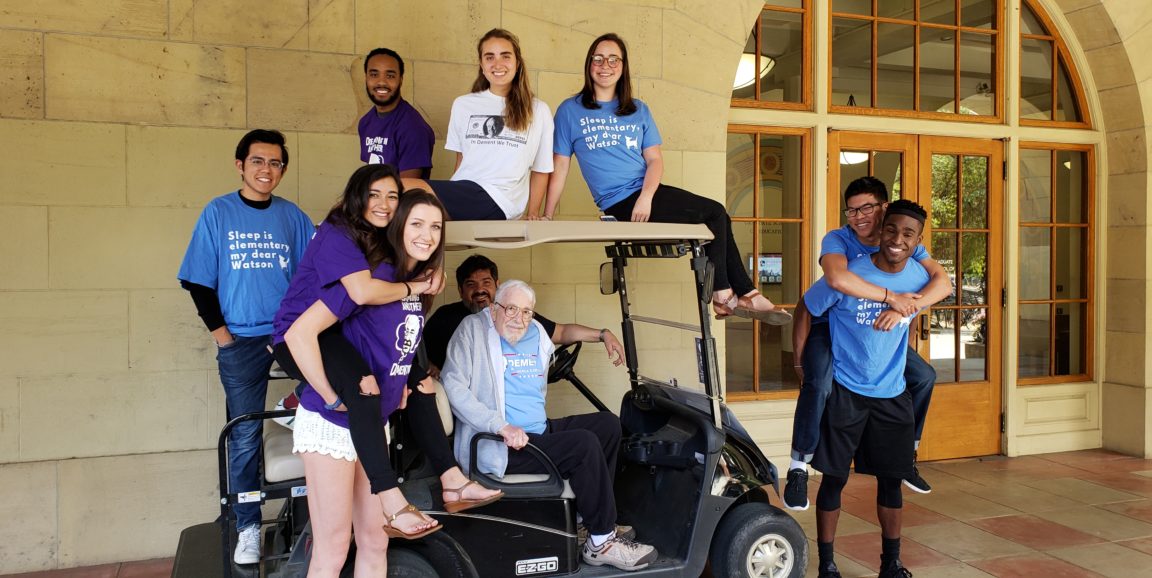Imagine a college class in which you get extra credit for falling asleep during a lecture -- and for enduring a rude awakening from the squirt of a water gun.
That tradition has lived on for decades in Sleep and Dreams, the popular undergraduate course founded by -- and until very recently taught by -- Stanford legend William Dement, MD, PhD.
Dement, widely known as the "father of sleep medicine," died this week, at 91, after a two-year battle with cardiovascular disease. He's being remembered far and wide for his extensive contributions to the field he helped create, and for his charming, quirky and overwhelmingly generous spirit.
As his colleague Emmanuel Mignot, MD, PhD, said in our obituary:
There are not a lot of people who can say they saved the lives of hundreds of thousands of people. ... But just by pushing this field forward, making sleep apnea recognized, as well as sleep disorders and sleep deprivation, Bill did that. Without him it would have still happened, but maybe 10 years later. Ten years is a lot of deaths.
For a sense of Dement's influence, just take a spin through social media, where former students and physicians, sleep medicine societies, experts and publications are posting their tributes -- often accompanied by affectionate words and heart-warming photos.
"My dear mentor Dr. William Dement, the Father of Sleep Medicine, leaves an unparalleled legacy & will be missed deeply," wrote Cheri Mah, MD, a physician scientist at the UC-San Francisco Human Performance Center. Mah worked with Dement as a researcher at Stanford.
"Without him, there would be no sleep field," wrote Meir Kryger, MD, a professor of medicine and clinical professor of nursing at the Yale School of Medicine.
Dement's passion for sleep came through in engaging and entertaining ways. Until recently, he was known to putter around the Stanford campus in his customized golf cart, which he dubbed the Sleep and Dreams Shuttle.
He was always up for a discussion about his favorite topic -- as he recounts in this Stanford video. When he bumped into former U.S. First Lady and former Democratic Presidential Candidate Hillary Rodham Clinton as she helped her daughter, Chelsea, pack up her Stanford dorm room, he provided an impromptu lecture on sleep and sleep disorders. "I think she's quite knowledgeable about this area now," he said in the video.
Dement's students said they felt knowledgeable after taking his course. It was helpful to record their own sleep quality, duration, dreams and other factors in a diary to gain insights into their personal requirements for rest.
Michaela Keefe, who just graduated from Stanford with both a bachelor's and a master's degree, said her performance on Stanford's championship volleyball team improved after she changed her sleep habits based on what she learned in the Sleep and Dreams class.
"Thanks to Dr. Dement and tracking my sleep in my sleep journal over the course of the quarter I took the class, I had a better idea of how much sleep I needed for optimal athletic performance," she said in an email interview.
Keefe noted that her parents -- a former National Basketball Association player and a volleyball player who competed in the 1996 Olympics -- also took and loved Dement's class: "They both are firm believers in the importance of good sleep hygiene, and also credit Dr. Dement with helping them to learn best practices regarding sleep," she said.
After Dement retired from teaching Sleep and Dreams about five years ago, his colleague Rafael Pelayo, MD, continued to welcome him at lectures. Pelayo said:
We got him a separate mic so he could chime in anytime he wanted. But he was in his 90s so sometimes he would fall asleep in class himself. Of course, we squirted him every time I noticed, and he was a great sport about it. He would immediately belt out the class "mantra" Drowsiness is Red Alert.
The squirt gun tradition, Pelayo said, is a fun and effective way to demonstrate the power of sleep and its amnestic properties. Students who deny snoozing are quizzed about the last thing they heard in class -- and if there's a memory gap, they're subjected to another squirt.
Pelayo said he plans to petition for the name of the course to be changed from Sleep and Dreams to Dement's Sleep and Dreams -- in honor of his longtime colleague.
Dement's zeal for sleep will also live on in another unique tribute. His son, Nick Dement, named his son Zaniel Zaiden Zooey -- purposely selecting the initials ZZZ for this grandchild.
Please submit your memories, stories and photos of Dr. Dement to retrout@stanford.edu. We'll plan to share some here.
Rosanne Spector contributed reporting.
Photo courtesy of Rafael Pelayo




